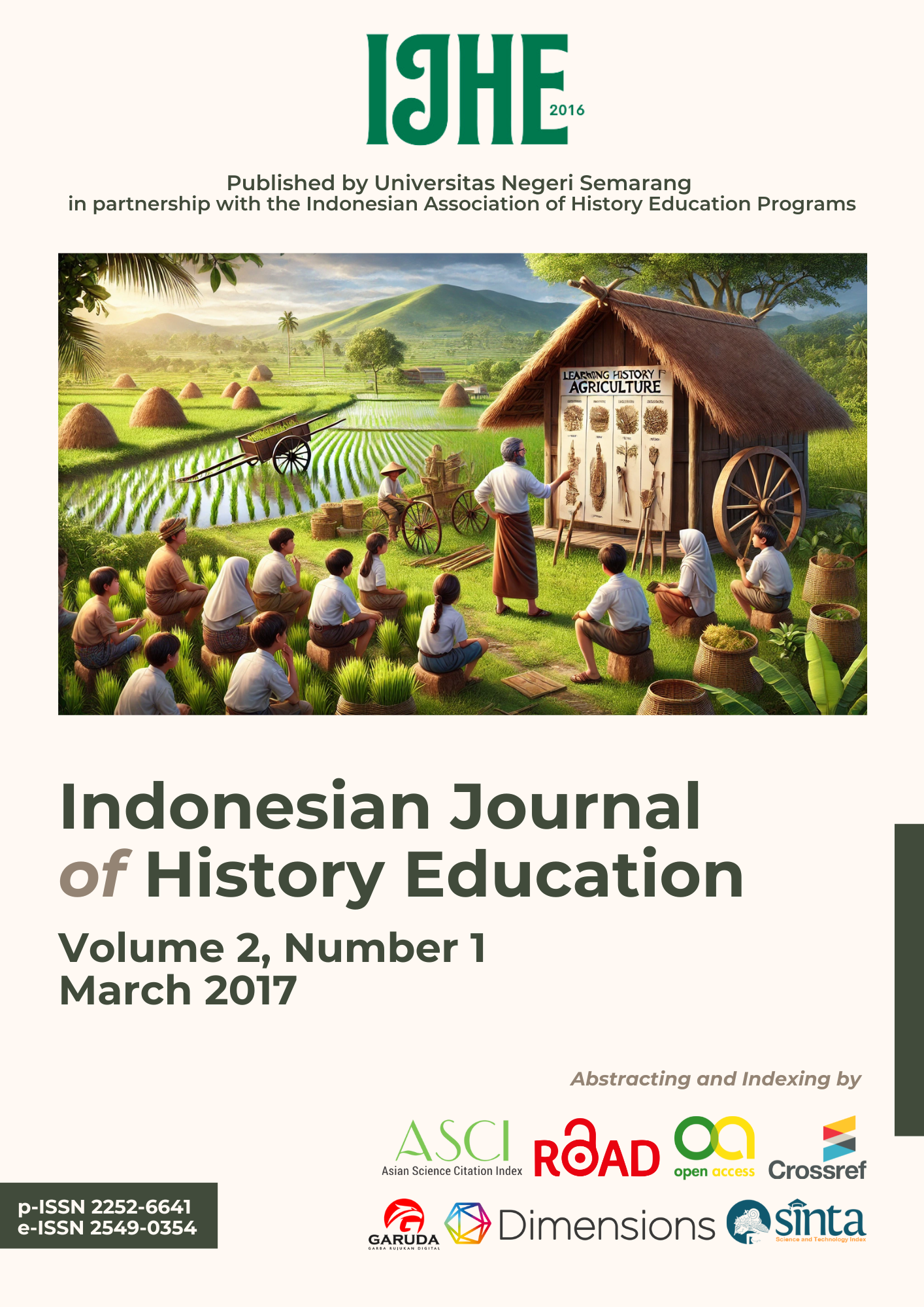Improving History Learning Outcomes Class XE students at SMA Negeri 1 Kaliwungu, Kendal Regency through the Talking Stick Learning Model 2011/2012 Academic Year
Abstract
This research is a classroom action research (CAR). Classroom action research (CAR) is a form of reflective investigation that is participatory and collaborative and has a goal to make system improvements, working methods, processes, content, competence, and a situation that begins with planning (planning ), action (action), observation (observation), and reflection (reflecting) until repair or improvement is achieved. The subjects in this study were students of SMA Negeri 1 Kaliwungu XE—still a need for classroom learning outcomes standard of 6.50. Based on the results of this study, it was concluded that learning talking stick models of learning outcomes are 63.625 to 64.50. It can be said to be increased by 0.875. Of the average value of the first and second cycles, 64.50 to 73.625.
References
Abdullah, T. (2007). Sejarah Pemikiran, Rekonstruksi, Persepsi, Media Komunikasi Profesi Masyarakat Sejarawan Indonesia. Jakarta. ISBN
Anni, Catharina Tri. (2004). Psikologi Belajar. Semarang: UPT MKK UNNES.
Arikunto, Suharsimi. (2002). Dasar-Dasar Evaluasi Pendidikan. Jakarta: Bumi Aksara.
Arikunto, Suharsimi. (2002). Prosedur Penelitian Suatu Pendekatan Praktek. Jakarta: Rineka Cipta.
Azizah, U. (2008). Efektivitas Metode Quantum Learning dengan Menggunakan Teknik Peta Pikiran terhadap Hasil Belajar Siswa pada Mata Pelajaran Sejarah (Doctoral dissertation, Universitas Pendidikan Indonesia).
Departemen Pendidikan dan Kebudayaan. (1990). Kamus Besar Bahasa Indonesia. Jakarta. Balai Pustaka
Dimyati dan Mudjiono, (1999). Belajar dan Pembelajaran. Rineka Cipta. Jakarta
Ghony, M. D. (2008). Penelitian tindakan kelas.
Hamalik, Oemar. (2006). Proses Belajar Mengajar. Bandung. Bumi Aksara
Makdalina, P. (2003). Perbedaan efektifitas metode diskusi dan metode ceramah dalam pembelajaran sejarah di MAN 3 Malang oleh Peptina Makdalina.
Maunah, B. (2009). Ilmu pendidikan.
Mulyasa, E. (2010). Penelitian tindakan kelas. Bandung: PT Remaja Rosdakarya.
Nasution, S. (2008). Asas-asas Kurikulum.Jakarta. Bumi Aksara
Nurbani, Y. (2004). Efektivitasmetode ceramah dengan metode diskusi kelompok sebagai metode pembelajaran sejarah: suatu eksperimen di kelas II SLTP Negeri12 Balikpapan tahun ajaran 2002/2003 oleh Yulita Nurbani.
Soewarso, H. (2000). Cara Peyampaian Pendidikan Sejarah Untuk Membangkitkan Minat Peserta Didik Mempelajari Sejarah Bangsanya. Jakarta. DEPDIKNAS
Sudiapermana, E. (2009). Pendidikan informal. Jurnal Pendidikan Luar Sekolah, 4(2).
Sudjana, Nana. (2001). Penelitian Hasil Proses Belajar Mengajar. Bandung. Remaja Rosdakarya
Suhardjo, (2003). Berbagai Cara Pendidikan. Bumi Aksara. Jakarta.
Suyitno, H. (2006). Hubungan Antara Logika Proposisi Dengan Logika Predikat (Suatu Kajian Epistemologis). Semarang. Badan Penerbit Universitas Diponegoro
Tim Penyusun Kamus Pusat Bahasa. (1995). Kamus Besar Bahasa Indonesia. Jakarta. Balai Pustaka
Tim Penyusun Kamus Pusat Bahasa. (2000). Kamus Besar Bahasa Indonesia. Jakarta. Balai Pustaka
Trianto. (2007). Model-Model Pembelajaran Inovatif Berorientasi Konstruktivistik (Konsep, Landasan Teoritis-Praktis dan Implementasinya). Jakarta : Prestasi Pustaka.
Universitas Negeri Semarang. (2008). Panduan Penulisan Karya Ilmiah.UNNES
Widja, I Gde. (1989). Dasar-Dasar Pengembangan Strategi Serta Metode Pengajaran Sejarah. Jakarta. DEPDIKBUD
Copyright Notice
An author who publishes in the Jurnal Indonesian Journal of History Education agrees to the following terms:
- Author retains the copyright and grants the journal the right of first publication of the work simultaneously licensed under the Creative Commons Attribution-ShareAlike 4.0 License that allows others to share the work with an acknowledgement of the work's authorship and initial publication in this journal
- Author is able to enter into separate, additional contractual arrangements for the non-exclusive distribution of the journal's published version of the work (e.g., post it to an institutional repository or publish it in a book) with the acknowledgement of its initial publication in this journal.
- Author is permitted and encouraged to post his/her work online (e.g., in institutional repositories or on their website) prior to and during the submission process, as it can lead to productive exchanges, as well as earlier and greater citation of the published work (See The Effect of Open Access).
Read more about the Creative Commons Attribution-ShareAlike 4.0 Licence here: https://creativecommons.org/licenses/by-sa/4.0/.




